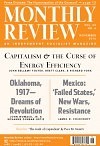Volume 62, Issue 06 (November)

Although the Great Recession officially ended in the U.S. economy more than a year ago (June 2009), for most people—especially the long-term unemployed, minorities, and youth—the effects are far from over. Indeed, it is a measure of the economic malaise in which the industrialized countries remain mired that the specter of stagnation is once again haunting mainstream discourse. As Paul Krugman recently observed, the U.S. economy is experiencing “what looks increasingly like a permanent state of stagnation and high unemployment” akin to the 1930s (“This is Not a Recovery,” New York Times, August 26, 2010) | more…
The Return of the Jevons Paradox
The curse of energy efficiency, better known as the Jevons Paradox—the idea that increased energy (and material-resource) efficiency leads not to conservation but increased use—was first raised by William Stanley Jevons in the nineteenth century. Although forgotten for most of the twentieth century, the Jevons Paradox has been rediscovered in recent decades and stands squarely at the center of today’s environmental dispute | more…
Society is increasingly humanizing the cosmos. Satellites have for some time been central to the flow of information, to surveillance, and to the conduct of warfare. As these examples suggest, however, the humanization of the cosmos is primarily benefiting the powerful. These include major economic and military institutions. Furthermore, the forthcoming commodification and colonization of the cosmos is again likely to enhance the interests of the powerful, the major aerospace companies in particular. The time has come to consider alternative forms of cosmic humanization. These would enhance the prospects of the socially marginalized. They would also allow humanity to develop a better understanding of the cosmos and our relationship to it | more…
A social volcano is bubbling in Mexico. Nearly half the country’s eligible voters showed their disgust with the country’s political parties by staying away from the polls in the off-year elections of July 2010. All the major political parties have become neoliberal and corrupt. Broad-based social movements are resisting a right-wing offensive, which, building on twenty-eight years of neoliberal economic policies, has led to the country’s increasing militarization. Following the 2006 fraudulent election of Felipe Calderón,1 a reign of terror was unleashed by means of his unconstitutional, self-declared “war” ostensibly against drug cartels involved in bloody internecine strife | more…
In August 1917, tenant farmers and sharecroppers in several eastern and southern Oklahoma counties took up arms to overthrow the United States government, to stop military conscription and U.S. entry into the war in Europe. Renegade Socialists, organized in their own “Working Class Union” (WCU), white, black, and Indian, they believed that millions of armed working people across the country would march with them to take Washington | more…
Though it is neither written nor marketed as such, Who Owns the Sun? by researcher/activists Daniel Berman and John O’Connor, is a devastating indictment of capitalism. As it has developed in the last two centuries, this system is an enormous user of energy, most of it derived from the burning of fossil fuels (coal, oil, natural gas). An additional—and in some parts of the world increasing—source is nuclear fission. Both of these forms of energy are dangerous and environmentally destructive to life on the planet. Burning fossil fuels generates almost all of the greenhouse gasses that have already begun to change the planet’s climate and, if continued at anywhere near the present rates, will trigger a chain reaction of lethal disasters, not in some vaguely distant future but in the next century or so—historically a relatively short span of time. Nuclear fission leaves a legacy of radioactive waste that cannot now, or perhaps ever, be safely disposed of. Clearly if humanity, not to speak of other forms of life, is to have a future, nothing could be more important than phasing out these sources of energy. So much, I believe, is what can be appropriately called ecological common sense | more…
